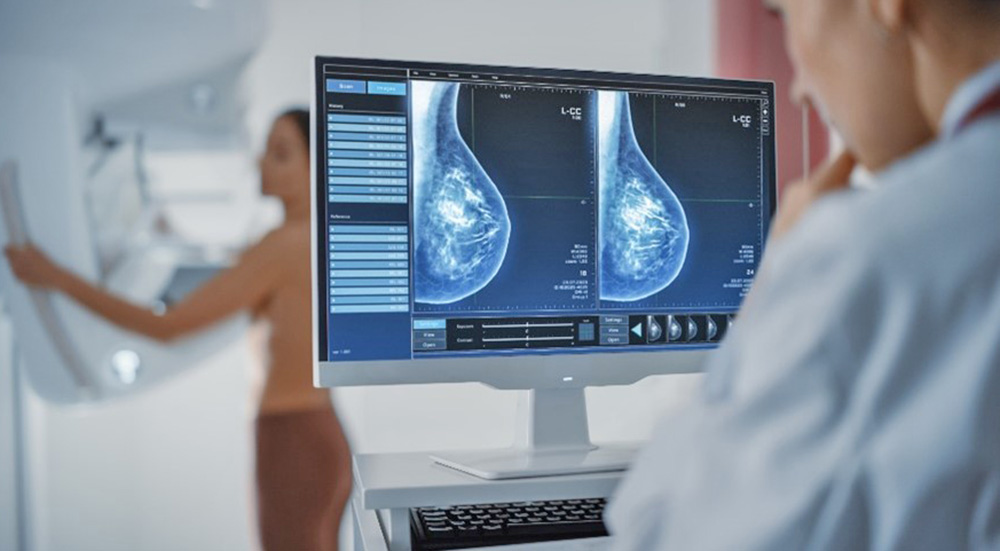Signed into law on June 7, 2022, the Dr. Kate Hendricks Thomas Supporting Expanded Review for Veterans in Combat Environment (SERVICE) Act (P.L. 117-133 ) expands breast cancer screening eligibility for Veterans and ensures research continues to advance our knowledge of toxic exposures and breast cancer.
Thomas was a Marine Corps Veteran and public health professional. She deployed to Iraq in 2005, where she was exposed daily to a burn pit on base. In 2018, she was diagnosed with stage 4 breast cancer. She died on April 5, 2022, at the age of 42. Her legacy of service lives on through the SERVICE Act.
Although no direct link has been found between toxic exposure and breast cancer, VA is concerned about tragic individual cases, such as that with Thomas, and continues to support research and examine case data.
“VA is committed to providing state of the art breast cancer services to all eligible Veterans. Through the SERVICE Act, we honor Dr. Kate Hendricks Thomas and other Veterans whose service to our nation may have exposed them to life-threatening toxins,” said VA Secretary Denis McDonough.
As a result of the SERVICE Act, VA will expand breast cancer risk assessments and clinically appropriate mammograms to women Veterans who have experienced toxic exposure. This risk assessment and mammogram also includes transgender women who have been on hormone therapy for more than 5 years, and transgender men who still have breasts.
VA to collaborate with DoD to expand eligibility
As part of the law, VA will collaborate with the Department of Defense to identify additional locations and time periods of service for toxic exposure, beyond those indicated in the current law. This will expand eligibility for these services in the future.
You may also have heard of the MAMMO Act. This is another law that will assist Veterans in accessing breast cancer screening and mammography screening. The Making Advances in Mammography and Medical Options for Veterans Act provides for expanded research, too. Under MAMMO, VA will ensure Veterans living in rural areas and those with paralysis, spinal cord injuries or other disorders have access to breast cancer screening. Through MAMMO, VA will also develop a Tele-screening Mammography Pilot using our outstanding Telehealth technology.
VA uses, and will continue to use, the American Cancer Society guidelines for breast cancer screening for average risk women. On-site mammograms are available at over 70 VA health care facilities and at convenient locations in the community.
If you are not currently enrolled in VA health care, you still may be eligible for a screening due to expanded eligibility under the SERVICE Act. Explore health care enrollment here.
With the enactment of the Promise to Address Comprehensive Toxics (PACT) Act Oct. 1, 2022, VA is now authorized to provide care and benefits to millions of toxic-exposed Veterans and their survivors. Contact your VA primary care provider to learn more or visit the PACT Act website. Discover the full range of VA health services for women Veterans. Visit Women’s Health Care Needs | Veterans Affairs (va.gov) or call the Women Veterans Call Center at 855-829-6636.
Topics in this story
Link Disclaimer
This page includes links to other websites outside our control and jurisdiction. VA is not responsible for the privacy practices or the content of non-VA Web sites. We encourage you to review the privacy policy or terms and conditions of those sites to fully understand what information is collected and how it is used.
More Stories
The Medical Foster Home program offers Veterans an alternative to nursing homes.
Watch the Under Secretary for Health and a panel of experts discuss VA Health Connect tele-emergency care.
The 2024 National Veteran Suicide Prevention Annual Report provides the foundation for VA’s suicide prevention programs and initiatives.







Hi. I’m a USMC woman Veteran that was stationed at camp johnson, camp lejeune in 1990 and was diagnosed with breast cancer when I got out of the service. I tested negative for family history of breast cancer as well. Should I apply for the pact act?
As a Marine Veteran who served together with many great service women, the recent expansion of the SERVICE Act to include Breast Cancer, reinforces our commitment to those deserving the best care from a thankful nation. A recent study revealing a 40% higher incidence of breast cancer for service women than the general population is concerning and giving more meaning to the importance of the Act’s expansion. Thank you Dr. Haskell for your message. Semper Fi